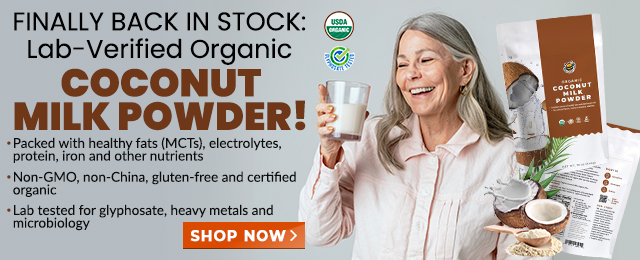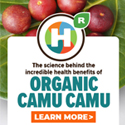Sweet potatoes for ex-smokers: Yams have been proven to fight emphysema, lung cancer growth
Friday, April 15, 2016 by: David Gutierrez, staff writer
Tags: sweet potatoes, lung cancer growth, emphysema

(NaturalNews) Ex-smokers and others looking to give their lungs a natural health boost can find help in a surprising place: the sweet potato.
And the healthful qualities of this remarkable vegetable don't end at the lungs: They extend to various types of cancer, and to a wide range of other health benefits.
Sweet potatoes (Ipomoea batatas) have been consumed by human beings for thousands of years. There are more than 8,000 varieties, ranging in color from white to purple — though yellow and orange varieties are most common, and are the types most strongly linked to lung health. Although people in the United States typically eat only the tuber of the plant, its leaves, roots and vines are also edible and cancer-fighting.
Eat more sweet potato... leaves!
Research into the effects of sweet potatoes on your lungs centers on the plant's high concentration of beta-carotene, which your body converts into vitamin A. This vitamin plays many important roles in the body, including in the health of the eyes, bones and immune system. Among other things, vitamin A and other carotenoids have been shown to aid in lung regeneration, including in people with emphysema.Another study, conducted by Taiwanese researchers and published in the Asia Pacific Journal of Clinical Nutrition in 2007, gave food frequency questionnaires to 301 people with lung cancer, along with 602 hospital controls and 602 neighborhood controls. They found that people who ate the most sweet potato leaves were 43 to 65 percent less likely to develop lung cancer than those who ate the least.
The study also found that those who had higher intakes of vitamin A, alpha-carotene or beta-carotene had a significantly lower risk of lung cancer. Overall vegetable intake was also associated with lower risk, although sweet potato leaves and garland chrysanthemum had the strongest effect.
Not just for your lungs
But the cancer-fighting benefits of sweet potatoes don't end there. Studies have shown that sweet potato extracts may reduce breast cancer tumor growth and inhibit leukemia cell growth; that the antioxidant anthocyanin (found in sweet potatoes and in red, blue and purple fruits and vegetables) reduces liver cancer tumor growth in mice; and that sweet potato intake may reduce the risk of gallbladder cancer in human beings.Another study found that while high intake of three to four separate varieties of starchy roots and tubers — including sweet potatoes, potatoes and taro root — had no effect on rates of kidney disease, it did significantly reduce death rates from the disease.
It may not be just carotenoids that are responsible for these benefits. Sweet potatoes are also high in the antioxidant polyphenols caffeic acid, dicaffeoylquinic acid and tricaffeoylquinic acid, which may also have cancer-fighting effects.
Sweet potatoes are also high in complex carbohydrates, fiber, vitamin C, riboflavoin, magnesium, manganese, potassium, calcium and iron. Their complex sugars make sweet potatoes an ideal food for diabetics and others who struggle with blood sugar levels, while their high fiber content may aid digestion and fight colon cancer. Among vegetables, they are high in vitamin D, which plays a critical role in the functioning of the immune system.
High levels of potassium and vitamin B6, along with fiber, make sweet potatoes a great food for your heart. Vitamin B6 also helps prevent strokes and degenerative diseases.
The beta-carotene in sweet potatoes also promotes healthy hair growth and prevents hair damage.
You can even get another use out of the water you use to boil sweet potatoes: You can use it as a wash or bath to cleanse pores, remove toxins and soothe irritated skin.
Sources for this article include:
HealthyFoodHeadlines.com
NCBI.NLM.NIH.gov
LiveStrong.com
NaturalNews.com
Science.NaturalNews.com
Sweet potatoes at FETCH.news
Get independent news alerts on natural cures, food lab tests, cannabis medicine, science, robotics, drones, privacy and more.
Take Action: Support Natural News by linking to this article from your website
Permalink to this article:
Embed article link: (copy HTML code below):
Reprinting this article:
Non-commercial use OK, cite NaturalNews.com with clickable link.
Follow Natural News on Facebook, Twitter, Google Plus, and Pinterest
- CLOT SHOT PLANDEMIC UNFOLDING: Fibrous, rubbery clots caused by covid injections have prion-like seeding activity
- Widespread social and economic unrest: Steve Quayle issues urgent financial warning of imminent asset collapse in new interview with Mike Adams
- DEATH by VACCINE or face PRISON time: Canadian Freedom Convoy leaders CONVICTED for protesting forced vaccination during the Covid Plandemic
- How to detox from metals falling out of the sky
- Aerosolized bioweapons? Strange “diploid biomasses” falling out of the sky in Florida captured under the microscope
- How the peanut allergy epidemic was fueled by faulty science and institutional arrogance
- How Israeli military-connected corporations are secretly controlling your online privacy
- “Rockefeller Medicine Men”: Today’s healthcare crisis stems from the creation of the American medical establishment
- Global financial Ponzi scheme collapses in real time as markets plummet, Mike Adams and Steve Quayle warn of impending chaos
- Thimerosal is 50 percent MERCURY and NO it has NOT been removed from vaccines - that was a BIG FAT LIE the CDC told vax skeptics to keep them vaxxed up and dying
- Kiss Your Genetic Privacy Good-Bye! 23andMe Gets Green Light to Sell Your Intimate Genetic Details to Anyone They Want
- Mike Adams releases country western hit single: Goin’ Back in Time is Comin’ Home
- Rep. Jamie Raskin demands that 17 deported Tren de Aragua and MS-13 gang members be returned to the U.S. from El Salvador
- The hidden war above: Chemtrails, HAARP and the battle for planetary control
- Washington State expands hate crime bill but ignores left-wing violence against Tesla owners
- Analysis: The coming economic collapse, a mass uprising and Trump's three secret weapons to halt the growing revolt
- Defunding DEADLY mRNA jabs: Government funding for mRNA technology being scrutinized and sidelined until proven "safe and effective" for real
- European Court of Justice: Healthcare professionals who promoted or administered COVID-19 vaccines are CRIMINALLY LIABLE for any harm caused
- Aerosolized bioweapons? Strange “diploid biomasses” falling out of the sky in Florida captured under the microscope
- European Court of Justice: Healthcare professionals who promoted or administered COVID-19 vaccines are CRIMINALLY LIABLE for any harm caused
- Newly released JFK files reveal Pentagon's role in creating Lyme disease and covid in the same lab
- Analysis: The coming economic collapse, a mass uprising and Trump's three secret weapons to halt the growing revolt
- FBI imposed gag order on agents to silence Hunter Biden laptop truth before 2020 election, new chat logs reveal
- Britain’s descent into police state censorship: Parents raided for questioning their daughter’s school system online
- “Project Aldrin”: Senate probes Meta's alleged censorship dealings with China
- Kiss Your Genetic Privacy Good-Bye! 23andMe Gets Green Light to Sell Your Intimate Genetic Details to Anyone They Want
- Oncologist warns of ‘terrifyingly aggressive’ cancers in children, linked to immune suppression from COVID vaccines
- Mike Adams releases country western hit single: Goin’ Back in Time is Comin’ Home
- Utah governor allows ban on LGBT pride flags in public buildings and schools, will take effect without his signature
- AI-powered forecasting model proves more accurate than traditional systems at predicting the weather
- When antibiotics are unavailable, natural ANTIMICROBIAL compounds become essential first line defenses against infection
- German researchers find link between mRNA vaccines and GENETIC CHANGES that precede CANCER and AUTOIMMUNE DISORDERS
- Defunding DEADLY mRNA jabs: Government funding for mRNA technology being scrutinized and sidelined until proven "safe and effective" for real
- The Health Ranger releases “Vaccine Zombie” song and music video, using AI-animated zombies for the music video
- Dr. Mary Talley Bowden drops bombshells about children being permanently damaged by mRNA jabs during Tucker Carlson interview
- The hidden war above: Chemtrails, HAARP and the battle for planetary control
- Newly released JFK files reveal Pentagon's role in creating Lyme disease and covid in the same lab
- California's social media censorship law struck down: A victory for free speech or a threat to online safety?
- The Health Ranger releases “Vaccine Zombie” song and music video, using AI-animated zombies for the music video
- Dr. Mike Yeadon releases 15-minute testimony - WATCH - about genocidal intent of COVID “vaccines”
- EPA advisor admits the agency is funneling billions to climate groups ahead of Trump’s return to White House
- Rep. Nancy Mace introduces bill to ban biological males from female facilities on federal property
- Mike Adams releases country western hit single: Goin’ Back in Time is Comin’ Home
- Florida takes a stand: DeSantis proposes permanent ban on mRNA vaccine mandates
- Sugarcane extract superior to cholesterol-lowering drugs?
- Survival 101: Effective EMF blocking techniques
- OpenAI whistleblower who dissented against how the company trained ChatGPT found dead
- CONSERVATIVES SOUND THE ALARM: Big Pharma and the Left trying to force $32 billion money grab from America’s seniors into year-end spending deal
- Pilots report mysterious lights 'moving at extreme speeds' across Oregon skies
- Attorney and TikTok influencer explains how he was offered hundreds of dollars to make false claims about Trump, Republicans
- Trump reverses course on Gaza plan, says “nobody is expelling Palestinians”
- Trump expected to choose Kelly Loeffler as his agriculture secretary even though she was caught INSIDER TRADING during COVID
- MEDICAL BOMBSHELL: FDA admits Covid mRNA 'Vaccines' CAUSE CANCER
- Marketing director responsible for WOKE Jaguar rebrand is also an LGBT activist who supports Black Lives Matter
- Red Cross issues warning to stop blood plasma donations from vaccinated people
- Scientists confirm: GENIUS brain function can be spontaneously unleashed in humans without any apparent cause
- EPA advisor admits the agency is funneling billions to climate groups ahead of Trump’s return to White House
- HYSSOP: What research reveals about the health benefits of this ancient holy herb
- Two containers with completed ballots fall out of truck in Florida
- Fully vaccinated about to see “tsunami” of illness and death, warns virologist
- Global leaders unite to clamp down on “misinformation” with UN-backed Cascais Declaration
- Newly released JFK files reveal Pentagon's role in creating Lyme disease and covid in the same lab
- BREAKING: 2025 NDAA authorizes mandatory military draft of WOMEN across America… as Pentagon pursues global NUCLEAR war with both Russia and China at the same time
- Michael Yon warns of a ZIONIST TAKEOVER in Trump’s second administration
- Ozempic and Wegovy weight loss drugs are injectable LIZARD VENOM PEPTIDES that may unleash a devastating wave of organ failure… side effects align with symptoms of SNAKE BITES
- BOMBSHELL: DNA testing kits are a SCAM to develop ethnic-specific bioweapons
- The Health Ranger releases “Vaccine Zombie” song and music video, using AI-animated zombies for the music video
- Israeli soldiers accused of even more torture and abuse in the West Bank
- These 13 countries just signed an agreement to engineer a global FAMINE by destroying food supply
- NASA admits that climate change occurs because of changes in Earth’s solar orbit, and NOT because of SUVs and fossil fuels
- RFK Jr. clears key hurdle: Sen. Susan Collins backs controversial HHS nominee, signaling a new era for health policy
- Sermon 30: How Jesus reveals Caesar’s FAKE CURRENCY and FALSE AUTHORITY
Science News & Studies
Medicine News and Information
Food News & Studies
Health News & Studies
Herbs News & Information
Pollution News & Studies
Cancer News & Studies
Climate News & Studies
Survival News & Information
Gear News & Information
News covering technology, stocks, hackers, and more



"Big Tech and mainstream media are constantly trying to silence the independent voices that dare to bring you the truth about toxic food ingredients, dangerous medications and the failed, fraudulent science of the profit-driven medical establishment.
Email is one of the best ways to make sure you stay informed, without the censorship of the tech giants (Google, Apple, Facebook, Twitter, YouTube, etc.). Stay informed and you'll even likely learn information that may help save your own life."
–The Health Ranger, Mike Adams












































